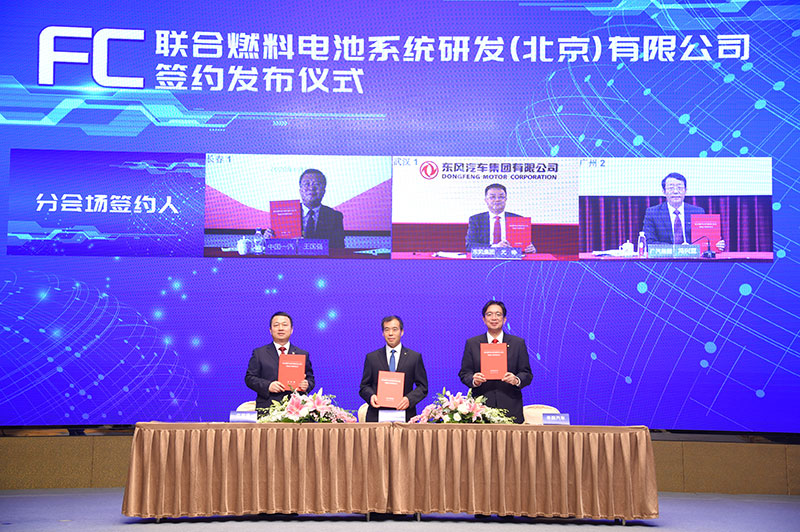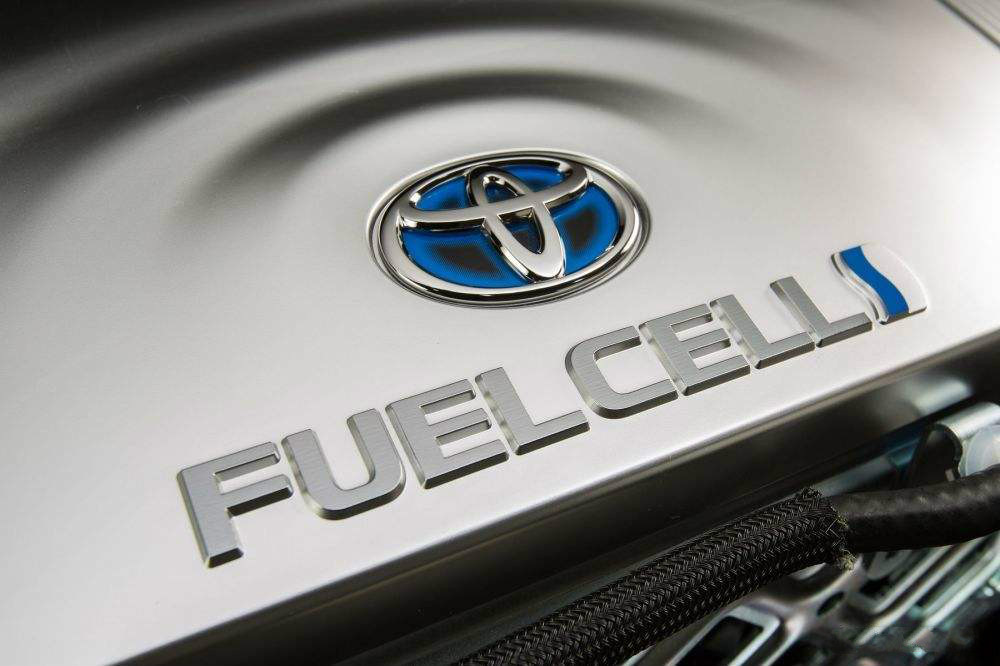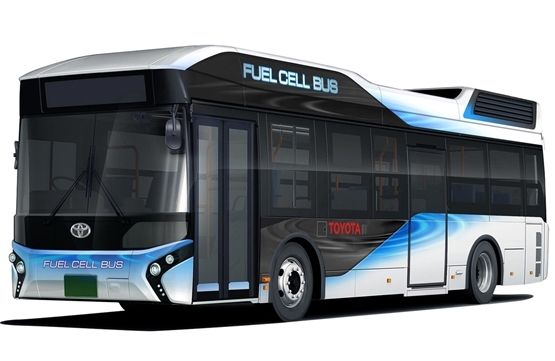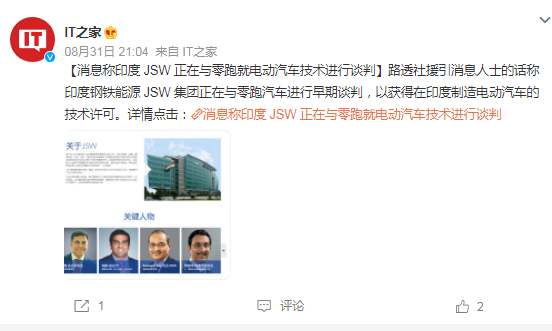In addition to Weibo, there is also WeChat
Please pay attention

WeChat public account
AutoBeta


2024-11-22 Update From: AutoBeta autobeta NAV: AutoBeta > News >
Share
AutoBeta(AutoBeta.net)08/22 Report--
Only two months after the completion of the contract and the opening of operation, Toyota set up another joint venture in China, while Toyota contributed 65% as a major shareholder. It means that the joint venture led by Toyota technology has been officially put into operation.
![1598067284913987.png G%}YOSFN4~(L1FEVZ%]CD7G.png](https://www.autochat.com.cn/uploadfile/ueditor/image/20200822/1598067284913987.png)
Joint fuel Cell system Research and Development (Beijing) Co., Ltd. was officially established in Beijing on Aug. 20, with a registered capital of 1.673 billion yen (100 million yuan) and operating period until August 2030, according to Tianyan check. The company is jointly established by six companies, of which Toyota Motor Co., Ltd. as a major shareholder accounts for 65%.
This is a commercial vehicle fuel cell system research and development joint venture. The company's business scope includes technical development of fuel cell systems for commercial fuel cell vehicles using Toyota single cells; technical consulting, technical services, technology transfer; import and export of goods, and import and export of technology. Dong Changzheng, senior executive deputy general manager of Toyota Motor (China) Investment Co., Ltd. is the chairman of the joint venture company, and Takashi Akita, deputy general manager of Toyota China Executive, is the general manager.

June 5, 2020, China first Automobile Co., Ltd., Dongfeng Motor Group Co., Ltd., Guangzhou Automobile Group Co., Ltd., Beijing Automobile Group Co., Ltd., Beijing Yihuatong Technology Co., Ltd., Toyota Motor Company formally signed a joint venture contract, and announced the establishment of Joint fuel Cell system Research and Development (Beijing) Co., Ltd.
The proportion of the new joint venture company is: Toyota 65%, Yihuatong 15%, FAW 5%, Dongfeng 5%, Guangzhou Automobile 5%, BAIC 5%. The main business is to carry out the research and development of fuel cell systems for commercial vehicles, mainly Toyota and Yihuatong, jointly funded by various companies, with the aim of popularizing hydrogen fuel cell vehicles (FCEV) in China, so as to promote the development of China's hydrogen energy society. According to the joint venture agreement, the total planned investment in the project is about 5.019 billion yen (about 330 million yuan).
Toyota China said the partnership will develop a competitive fuel cell system that complies with Chinese regulations. The six companies will jointly plan their products through consultation and carry out a series of technological research and development work to meet the needs of the Chinese market, such as "component technology such as FC stack", "FC system control technology" and "vehicle carrying technology". This will greatly shorten the time from development to production, and speed up the popularization of FCEV in China's commercial vehicle market. The company will develop a fuel cell system and its main components that are capable of power, energy consumption and durability, lower cost and more competitive, which is also an indispensable part of popularizing FCEV.

Toyota's plan to vigorously introduce hydrogen fuel cell technology in China has long been announced and has carried out technical cooperation with a number of Chinese automakers.
As early as October 2017, Toyota built a test refueling station, TMEC Changshu, in Changshu, Jiangsu Province, to explore the possibility of introducing hydrogen-fueled vehicles to China. Toyota believes that hydrogen fuel cells will play a greater role in popularizing electric vehicles, a move that will contribute to the rapid popularization of fuel cell technology in China.
In 2019, Toyota successively reached technical cooperation on fuel cells with Chinese companies such as BAIC Foton, FAW and Suzhou Jinlong, and Toyota provided partners with key components of hydrogen fuel cells.
In September 2019, Toyota successively reached strategic cooperation with joint venture partners GAC and FAW to comprehensively promote new energy vehicles and energy-efficient vehicle products, including cooperation in hydrogen fuel cell technology. As far as GAC is concerned, it is mentioned in the technical cooperation agreement that the future models of GAC and GAC Toyota will be equipped with fuel cell technology.
The conclusion of these cooperation, or based on Toyota's opening to its own technology patents, further expand its advantages in this field. In April 2019, Toyota held a press conference at its headquarters in Nagoya and officially announced the opening of more than 20,000 valid patents. Toyota provides free patents on hybrid electric motors, electronic controls and system controls, as well as patents on fuel cells and related technologies. The patent will be available until the end of 2030, and it is necessary to apply to Toyota and sign the contract after discussing the specific implementation conditions.

There is a view that Toyota is to open its own patented technology in advance, and if more enterprises choose to use it, Toyota will certainly have a share of the hydrogen fuel cell vehicle market in China and even the world in the future. This is also reflected in Toyota's joint ventures with a number of Chinese carmakers. Toyota and Akio Toyoda have put forward the idea of "the most important in China" and further accelerated the development of Toyota's business in China.
Fuel cell vehicles can achieve zero emissions, which is better than pure electric vehicles in terms of convenience, but due to high cost, difficulty in marketing and other factors, the industry can not develop effectively. Toyota has stepped up the introduction of technology, perhaps taking a fancy to the vacillating tuyere of new energy vehicle technology, pushing fuel cell technology to a stage of mass production promotion, in which the Chinese market is the most important market to achieve promotion.
Welcome to subscribe to the WeChat public account "Automotive Industry Focus" to get the first-hand insider information on the automotive industry and talk about things in the automotive circle. Welcome to break the news! WeChat ID autoWechat
Views: 0
*The comments in the above article only represent the author's personal views and do not represent the views and positions of this website. If you have more insights, please feel free to contribute and share.











© 2024 AutoBeta.Net Tiger Media Company. All rights reserved.